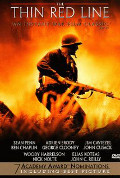
Directed by
Terrence Malick
170 minutes
Rated MA
Reviewed by
Bernard Hemingway


The Thin Red Line
There ain't nothin' good to be said about war and Terrence Malick's film says it mighty well. Set during the battle for Guadalcanal during WW2, this engrossing version of the James Jones novel (which I haven’t read and which was previously filmed in 1964 with Keir Dullea and Jack Warden), interpellates the usual scenes of combat carnage with the voice-overed thoughts of various men caught up in it, these often twinned with lambent images of Nature’s indifferent beauty. Indeed the opposition between Nature and Man which is central to the film is articulated in the opening section by Jim Caviezel ‘s Pvt. Witt. The latter is the closest the film comes to having a lead character as we see Witt and another soldier who have gone A.W.O.L. revel in a Polynesian idyll. They are arrested and eventually find themselves thrown into the hell of a frontal assault on a Japanese-held hill. The assault constitutes the middle section of the film before it enters on its third stage, a kind of post-combat sequel which returns to the manner of the more personally reflective first stage.
Released the same year as Spielberg's much more conventional Saving Private Ryan, The Thin Red Line was Malick’s first film since Days Of Heaven in 1978. It is an impressively ambitious film brilliantly photographed by John Toll but the main battle sequence aside (which needs to be seen on a big screen for full impact) is less about the action or historical specifics than it is a philosophical/poetic reflection on war in general as man’s business (much is made of the father-son relationship). One is inclined to wonder whether this whole section, particularly with its return to combat is necessary and whether some judicious shaping could have achieved the same effect, if not more, by eliminating some of the reiterative material.
Malick makes extensive use of voice-overs, a technique which allows him to articulate the inner world of each of the main characters while at the same time setting them in the unifying reflective space in which they share This approach is resonately amplified by Hans Zimmer’s evocative music. Engaging performances come from Nick Nolte as a career soldier for whom the war is his last chance for validation, Elias Koteas as the officer trying to save his men from becoming fodder for his Colonel’s ambitions, and Sean Penn as a dourly cynical N.C.O. whose running debate with the metaphysically-inclined Witt (Jim Caviezel) constitutes the film’s main thematic thread. Despite the all-star cast many of the better-known names, notably John Travolta and George Clooney, have only walk-on roles.
Despite its undue length The Thin Red line deserves to be on any short-list of the best war films
Want something different?





